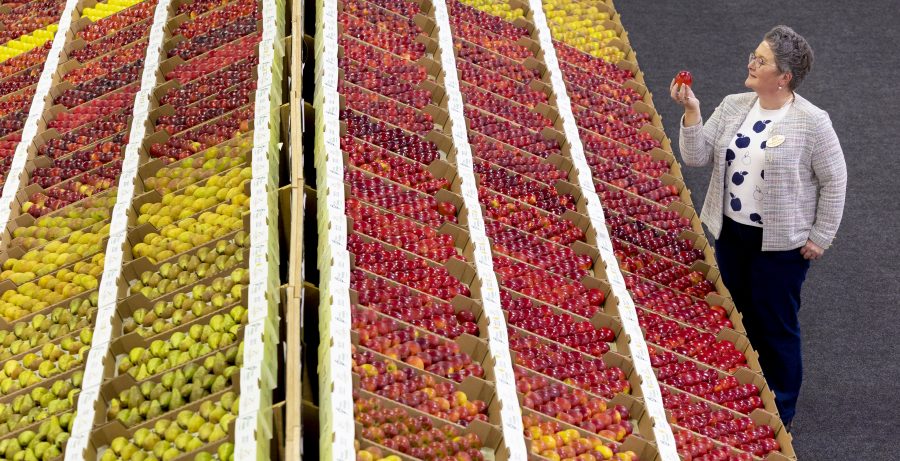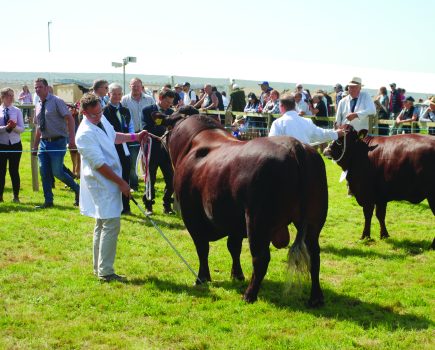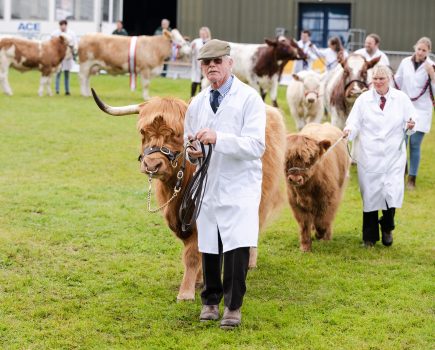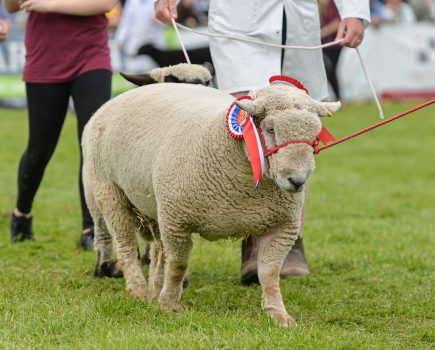It’s not unusual for someone to refer to a comfortable and supportive working environment as being “like family”, but it’s rare for it to be true.
For Sarah Calcutt, though, her time at the helm of the National Fruit Show reflected the close involvement of her family in the show throughout much of its history. “If you threw a stick into the exhibition hall during a show you would probably hit someone I was related to in some way,” she commented.
After nearly 20 years supporting the show, including the past two serving as executive chair of organisers the Marden Fruit Show Society (MFSS), Sarah has moved on to a new role as chief executive of City Harvest London, handing over the reins of an institution that is celebrating its 90th birthday this coming November to the capable hands of Sally Flanagan.
In that role, Sarah heads up a charity that has just delivered its 50 millionth meal to deserving families – without ever buying a single item of food. The food it distributes is diverted from waste streams and instead donated to the cause (“anything that’s good to eat but too ugly to sell or is close to its expiry date,” she explained).
With female chief executives now more common than they were when Sarah first chaired the MFSS 14 years ago, and the city perhaps less ‘traditional’ than the male-dominated world of horticulture, she no-doubt had a warm, equal opportunities welcome from her City Harvest colleagues.
In contrast, she recalled bringing members to order when she took the chair at her first committee meeting. “A voice from the back of the room piped up with: ‘Young lady, if I had wanted to be nagged, I would have stayed at home’,” she explained.
It was a challenge she overcame, and, as she admitted, was somewhat self-inflicted. “I joined the committee when Jeremy Scott was chairman,” she said. “I drove him mad continually telling him how I thought it could be improved, and so in 2009 he decided to make me put my money where my mouth was, as they say. He made me junior vice-chair, giving me three months’ notice before I took over the hot seat.”
It was a baptism of fire for someone who had just returned from a year abroad on a Nuffield Scholarship and who also gave birth to daughter Aurelia that same year, but she had considerable support.
“Robert Oliver was a great vice chair, offering the best kind of support you could wish for,” Sarah recalled. “He was dedicated, intelligent and had no desire to sit in your seat. I came in with all guns blazing and in contrast he provided a steady hand and was able to knock the rough edges off my enthusiasm and occasional ability to annoy people!
“It was also Robert, who is still on the committee and had served as Jeremy’s vice chair, who was the inspiration and driving force behind the suggestion that we should turn the fruit show society into a CIO (Charitable Incorporated Organisation).”
Norma and Brian Tompsett, themselves stalwarts of the fruit show, first held in 1933, championed the ‘young lady’ whose ideas were always going to upset some of the long-standing members.
“I had a vision for the show which was based on transforming it,” she recalled. “I knew we had to make it commercial and ensure it was nationally relevant or go back to showing a few apples in a shed in Marden. We had to go for it, shake it up, and I am so grateful that the committee was brave enough – and hard-working enough – to help me realise that vision.”
Sarah first attended the National Fruit Show in a pram, aged just four months. It was the start of a long relationship with something that has been – and will doubtless continue to be, despite her new role – an important part of her life.
Her great uncle Stanley was also part of the team for many years and was on the committee when much-missed former
South East Farmer correspondent the late Peter Tipples was in the chair. “They had a great friendship but it was a bit up and down over the years,” said Sarah. “The minutes indicate the odd row – usually over the hospitality budget for the show lunch!”
Sarah has a complete collection of show handbooks covering the events she has attended. One of the less obvious things she is proud about is how the look and feel of the book has become more professional in recent years.
“The handbooks include lots of the same family names recurring over the past 90 years,” she said. “And the classes have stayed essentially the same, too. Those who took part in 1933 would recognise the schedule today.”
Fruit played a part in bringing together Sarah’s parents, Susan and Bill Calcutt, who farmed Four Wents Farm in Goudhurst, where Sarah still has 60 acres, now farmed by tenants.
Bill’s uncle Stanley asked John Lawrence, who farmed at Hartley Dyke, Cranbrook, to plant an orchard of Conference pears for him, which is how John and Mary’s daughter Susan met Stanley’s nephew Bill – and the rest is history.
Bill’s mother – Sarah’s grandmother Biddy Tassell – and her sisters also all married local farmers, which is another reason why each National Fruit Show is akin to a family reunion. Either her father Bill or her maternal grandparents took her to the show as a youngster and she can recall helping to pack fruit samples for the show as a child.
Dad Bill, who died just before the show last year at the age of 84, had stewarded at the show in his twenties and continued to be a regular attendee and supporter.
Sarah was not encouraged to go into farming as a child and instead studied for a music degree in Cardiff and enrolled on a graduate training programme to become a buyer, still in Wales.
She recalled how she found herself back on the farm. “I was home for dad’s 60th birthday party, and towards the end of the evening he became rather emotional about the fact that there was no-one in the wings to take over from him if and when he retired,” she said.
“I took this as my cue, quit my job and was back home by Christmas pruning pear trees – the same pear trees that brought my parents together – in the snow.”
Sarah worked alongside her father for almost seven years, studying for a part-time horticulture degree at Hadlow College at the same time, although she admitted: “He never really managed to get his head around the idea of a woman running the farm.”
She then worked for Lantra, the land-based training and qualifications provider (“still in farming but supporting the economy and helping with training and skills”) before being invited to join Hadlow College as a skills adviser and later as business development manager.
“The first thing I did was organise a big party to bring industry leaders together as this was 2004 and everyone was working hard to save Hadlow from being absorbed into a larger organisation. I was part of a brilliant team that helped relink it with the community and made sure that what it was delivering was relevant,” she recalled. That same year she joined the MFSS committee.
Missing farming, Sarah then moved to work with top fruit marketing company Norman Collett, dealing with technical issues such as audit and quality control and working closely with Tesco and other large supermarkets.
In 2008 on 16 October, the day after that year’s National Fruit Show, she left the UK on her Nuffield Scholarship trip, looking at effective marketing strategies for fruit across the United States and New Zealand.
When she joined the fruit show team Sarah’s ambition was clear, at least to her. “I wanted to turn it into a kind of UK-focused Fruit Logistica – a great trade show featuring the best technology, the latest innovations, great fruit and a chance to hear from all the people you wanted to listen to while catching up with friends and colleagues.
And looking back, does she think she succeeded? “Yes. We have got the fruit show to the size where it has real relevance to all fruit industry professionals and can do better for the industry and the growers. It was always my ambition to create a paid role at the head of the organising team and we achieved that two years ago.”
The number of trade stands at the Detling showground event has risen from 62 when Sarah joined the committee in 2014, to 98 this year, while the lunch has become a popular and well-attended dinner.
The fruit display has grown and contracted over the years, reflecting the fortunes of the industry but always stunning and the result of a great deal of enthusiastic work by growers, committee members and judges.
“It’s a myth that it’s hard to pack a sample of fruit,” Sarah added. “The challenge now is to get retailers involved again. Tesco and Waitrose have been involved in the past and it would be good to have more support from that direction.
Industry body British Apples and Pears continues to support the event, with chair Ali Capper due to speak at this year’s show on 1 and 2 November. “BAPL and MFSS working closer together has been a long-held wish of mine,” Sarah commented. “It’s started to happen, with a joint AGM planned for 2024, and it’s something that I am sure the new team will build on. The show generates a great deal of publicity for English top fruit.”
In 2014 the committee re-introduced the idea of taking a tray of fruit from the show to the Late Queen, the Prime Minister, and the Secretary of State, while the following year similar gifts were also taken to Mansion House and to the DEFRA headquarters in Smith Square.
In the past the committee had taken the fruit display on tour the week after the show, transporting it lock, stock and barrel to places including Chatsworth, Basingstoke, Harrogate and Kew. “It took a huge amount of work by a dedicated team, but it simply wasn’t sustainable, so we ended that and instead concentrated on the high-profile visits to Number Ten and the like.
“We began donating the display fruit to charities, ensuring that children could enjoy some of the amazing quality fruit. That is how I came across City Harvest, having been introduced by Teresa Wickham, former president of the National Fruit Show, via the Lord Mayor of London in 2020.”
The profile of the show has been raised in recent years, with national press coverage now common and appearances on shows such as Countryfile. NFU President Minette Batters first attended in 2018 and has been to the show three times during her ten years in office.
DEFRA Minister of State Victoria Prentis opened the show in 2021, while last year saw a real coup when the guest of honour was The Countess of Wessex, now Sophie, Duchess of Edinburgh.
Sarah is particularly proud of the society’s education programme, set up by Sam Smith and now nationally recognised and utilised. Running now for almost 12 years, it links with the STEM (Science, Technology, Engineering, and Mathematics) curriculum and features a broad range of online teaching resources.
Alongside the successes, there have been challenges, not least in 2013 when hosts the Kent County Agricultural Society were ‘between halls’, having been given permission to build a new venue to replace what had been a former Afghanistan field hospital.
“They put up a large canvas tent, but because it was cold we had to heat it, which meant that with rain outside and the condensation inside it became a miserably wet experience for everyone,” Sarah recalled. “There were puddles everywhere, along with the sound of exploding lightbulbs.”
But while that may have been a miserable experience, the future is exceptionally bright, in Sarah’s view. “The show is in very, very good hands. Chairing the society has been an incredible honour and will always be one of the greatest things I have achieved,” she concluded.
For more like this, sign up for the FREE South East Farmer e-newsletter here and receive all the latest farming news, reviews and insight straight to your inbox.







